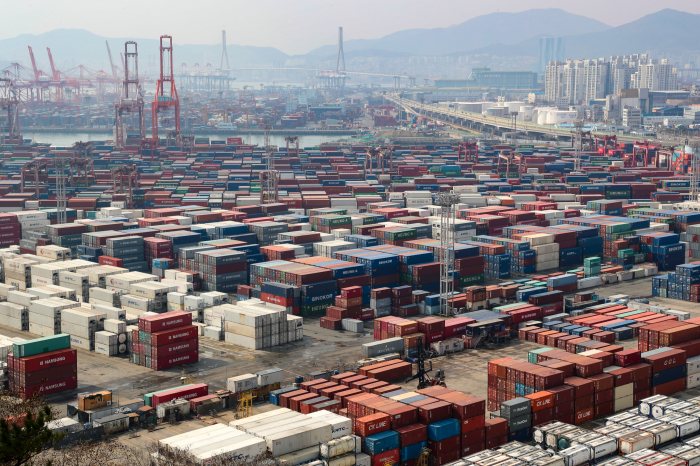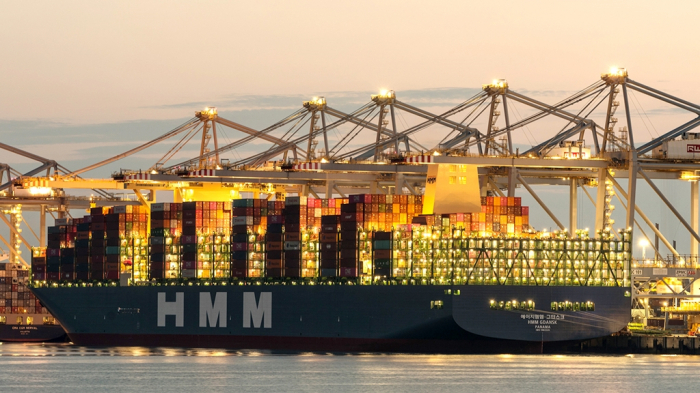Russia-Ukraine war disrupts Korean exports to Europe
South Korean exporters are in a bind due to suspended ground, sea and air routes to and from Russia
By Mar 07, 2022 (Gmt+09:00)
Samsung shifts to emergency mode with 6-day work week for executives


Alibaba eyes 1st investment in Korean e-commerce platform


Blackstone signs over $1 bn deal with MBK for 1st exit in Korea


NPS loses $1.2 bn in local stocks in Q1 on weak battery shares


MBK eyes stake in Korean software developer Tmaxsoft



Suspended land, air and sea routes to and from Russia are putting South Korean exporters ŌĆō from Samsung Electronics Co. and Hyundai Motor Co. to small-sized manufacturers ŌĆō in a bind, with their shipments headed for Russia stranded in the Port of Busan or in other countries.┬Ā┬Ā
Russia is South Korea's 10th-largest trading partner, from which Asia's No. 4 economy imports key raw materials such as crude oil, aluminum and naphtha. It also serves as a gateway to Europe for Korean exporters.
After Russia invaded Ukraine late last month, almost all Russia-bound cargo ships and airlines have been stopped.
Regarding land transportation, Korean exporters have increasingly switched to the TransŌĆōSiberian Railway (TSR) to move their goods to Europe after air and seaborne freight rates shot up in the protracted pandemic situation.
In other words, the bulk of their Europe-bound goods was loaded on a cargo liner in Busan, on the southeastern tip of the Korean Peninsula and shipped to Vladivostok, Russia. They were then transported via TSR to Europe.┬Ā┬Ā
RAILROADS
Since the outbreak of the war in Ukraine, the TSR route between Moscow and Ukraine's capital city of Kyiv has been suspended. The route connecting Moscow and St. Petersburg is currently operating normally but has not received new bookings since the start of this month, according to logistics industry sources on March 6.
Now that the TSR's Moscow-Warsaw route via Kyiv has also been suspended, Korean logistics companies are shifting to the third Moscow-Warsaw route via Minsk, Belarus.
But as the US and European Union step up sanctions against Belarus, which supported Russia's invasion of Ukraine, the TSR Moscow-Minsk-Warsaw route is exposed to shutdown risk as well, according to industry sources.
If the last TSR route is suspended, all road transport routes from South Korea to Europe will likely be cut off.
On Sunday, South Korea announced export sanctions against Belarus to block exports of some goods to the country, mirroring its recent export controls imposed against Russia.
"If the war in Ukraine is prolonged, the transshipment market from the port of Busan to the port of Vladivostok and then to Europe via the TSR could collapse," said a logistics industry official.┬Ā┬Ā
SEA ROUTES
According to the Busan Port Authority, Russia is one of the few popular stopover places for cargo ships departing from Busan, South Korea's largest port city. In January 2022, cargo volume from Busan to Russia surged 58% on-year, exceeding the average annual growth of 35% since 2020.
The number of regular container liners operating from Busan to Russia had more than tripled to 15 on-year as of January 2022.
┬Ā

IMPACT ON POSCO, SMEs
"Because logistic routes are blocked, we stopped our terminal operations there," said a POSCO International official.┬Ā
For a South Korean portable stove manufacturer, its gas stoves have been stuck in Turkey since the Russia-Ukraine war broke out. The goods were supposed to be delivered to its client in the Port of Odessa, according to the Korea International Trade Association (KITA).
The company now needs to pay long-term storage fees for the goods, unless it finds a new buyer for the portable stoves in Turkey.
"We'd like to dump them into the sea," said an official of the company, asking for anonymity.

AIR ROUTES
Korean Air Lines Co. on March 5 stopped its passenger flights to and from Moscow until March 18 since its planes cannot be refueled in Moscow. Korean Air flew once a week between Seoul and Moscow.
Another domestic carrier Asiana Airlines Inc. said on Sunday that its Europe-bound cargo planes, which operated seven times a week, would not make a stopover in Moscow from March 6 to March 20.
The flight cancellations added to the difficulties for Korean exporters.
An unidentified Korean components maker was recently ordered by a big domestic client with operations in Russia to pay a penalty for delayed delivery.
"We cannot help but pay the penalty not to ruin our relationship with the big client," the company official told The Korea Economic Daily.
SEEKING EMERGENCY GOVT SUPPORT
Over the past week, the trade association has collected 346 cases from South Korean companies having difficulties in shipping their products, or having yet to receive payments from clients in the wake of the Russia-Ukraine war. Of the cases, 56% were related to payments and settlements.┬Ā
Issues related to logistic routes and supply chains came next, accounting for 32% of the cases.
A domestic welding machine company has been unable to deliver its products to a Russian client since late last month. The ship carrying its welding machines has been stranded in Amsterdam, where it was supposed to stop over for a few days on its way to St. Petersburg.┬Ā
"Not just enormous losses from additional freight charges and storage fees, we have to pay a penalty to our client for failing to meet the delivery schedule," said an official of the company, asking for anonymity for both his company and himself.┬Ā
A growing number of Korean small and medium-sized exporters are asking for emergency financial support from the government to pay for their increased logistics costs, including storage fees, according to the KITA.┬Ā┬Ā
Write to Kyung-Min Kang and Jeong-Min Nam at kkm1026@hankyung.com
Yeonhee Kim edited this article.
-
 EconomyTougher sanctions on Russia put S.Korean exporters on high alert
EconomyTougher sanctions on Russia put S.Korean exporters on high alertFeb 24, 2022 (Gmt+09:00)
2 Min read


